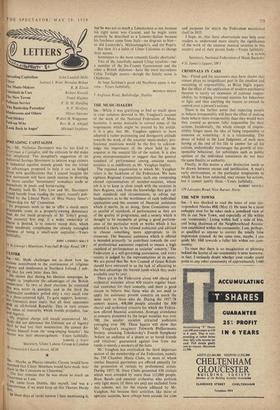THE MUSIC-MAKERS
SIR,—While it was gratifying to find so much space in your columns devoted to Mr. Vaughan's account of the work of the National Federation of Music Societies, it seems desirable to correct some of the impressions which might be created by his article. It is a pity that Mr. Vaughan appears to have adopted a rather patronising and derogatory attitude towards the work of the amateur music-maker; pro- fessional musicians would be the first to acknow- ledge the importance of the place held by the amateur in the musical life of the nation. It is also gross misrepresentation to suggest that the general standard of performance among amateur music societies is as indifferent as Mr. Vaughan implies.
The regional organisation to which Mr. Vaughan refers is the backbone of the Federation. We have eighteen Regional Committees, each one comprising elected representatives of member-societies, whose job it is to keep in close touch with the societies in their Regions, and, from the knowledge they gain of their standards and circumstances, to advise our headquarters as to the worthiness of each individual application and the amount of financial assistance which it merits. In so doing, these Committees are as careful of standards of performance as they are of the quality of programme, and a society which is , thought to be incapable of giving a good perform- ance of the particular work or works which it has selected is likely to be refused assistance and advised to .choose something more appropriate to its resources. The financial assistance which is offered • is intended primarily `to contribute towards the cost of professional assistance required to ensure a high standard of performances at societies' concerts.' The Federation is a self-governing association, and every • society is judged by the representatives of -its peers. We are proud-that the Arts Council of Great Britain should have entrusted to us the task of allocating to the best advantage the limited funds which they -make t available year by year.
There are in the Federation about 640 choral and orchestral societies: about 450 receive regular finan- cial assistance for their" concerts, and there is good reason to believe that those who do not need to apply for assistance preient concerts on much the same scale as those who do. During the 1957/58 • concert season, , 408,000 people attended the 800 choral and orchestral concerts for which the Federa- tion offered financial assistance. Average attendance at concerts presented by the larger societies was over 700; the smaller societies attracted audiences , averaging over 300. These figures will show that Mr. Vaughan's imaginary Tolworth Philharmonic Society, attacking Tchaikovsky's Fourth Symphony 'before an audience of a dozen or so bored friends and relatives,' guaranteed against loss from our funds, is merely a mockery of the facts.
Mr. Vaughan has overlooked the third important section of the membership of the Federation, namely the 150 Chamber Music Clubs, to most of whom similar financial guarantees arc offered annually for the promotion of recitals by professional artists. During 1957/58, these Clubs promoted 650 recitals which were attended by more than 112,000 people. Brass Bands and amateur orchestras who perform . only light music (if there are any) are excluded from this scheme, not for the reason adduced by Mr. Vaughan, but because their activities, like those of operatic societies, have always been outside the aims
and purposes for which the Federation' established itself in 1935.
I hope, sir, that these observations may help your readers to understand more clearly the significance of the work of the amateur musical societies in this country and of their parent body.—Yours faithfully, R. B. ELWIN, Secretary, National Federation of Music Societies














































 Previous page
Previous page